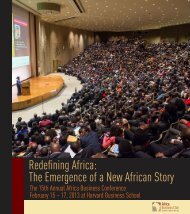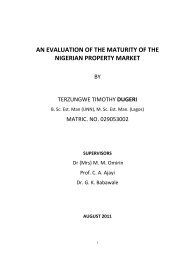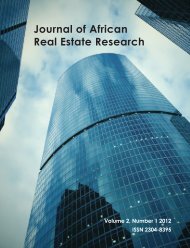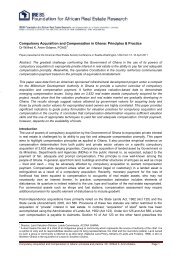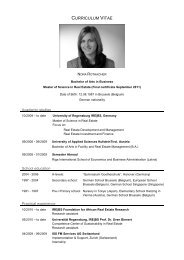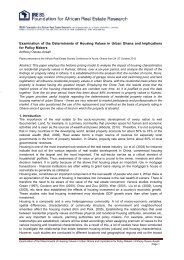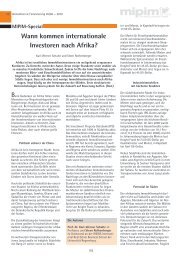You also want an ePaper? Increase the reach of your titles
YUMPU automatically turns print PDFs into web optimized ePapers that Google loves.
12funds connected with the business, dividends, receipts fromliquidation, assets and wages. However, transfers must becompleted before certified intermediates. Exchange controls areprimarily regulated by the rules of the Economic Community ofWest <strong>Africa</strong>n States (ECOWAS). Transfers are authorized in theoriginal currency of the investment.TaxationMandatory taxes to be paid by a company per annum are asfollows:Corporate income tax (30%)Social security contributions (16%)Business license (8%) + fixed amountPayroll and apprentice tax (4%)Capital gains tax (10%)Mortmain property tax (10%)Tax on insurance contracts if any (20%)Stamp duty on contracts (CFA200 (approx. US$50) perpage)Value Added Tax (18%)Motor vehicle tax if any (CFA50 000 (approx. US$104) basedon the weight of truck).Furthermore, Burkina Faso’s customs fees are based on goods advalorem and include a 5% customs fee, an import fiscal duty anda value added tax based on the type of equipment.Import/ExportImports account for US$ 1.81 billion of the economy and consistmainly of machinery, agricultural products, electrical goods andpetroleum. Exports account for US$ 629 million and consistmainly of agricultural goods, cotton, livestock and shea butter.Gold is also an important export.Monetary PolicyBurkina Faso’s monetary policy is largely based uponliberalisation. In addition, it is determined by the Central Bank ofWest <strong>Africa</strong>n States (BCEAO) whose priority is to controlinflation. Its monetary policy remains influenced by theEuropean Central Bank as the CFA franc is pegged to the Euro.Burkina Faso’s BCEAO-led monetary policy is accordinglystrongly influenced by the monetary policy conducted in theEuro zone.Legal SystemThe legal system is based on the French civil law system andcustomary law. At the top of the judicial system is the SupremeCourt. Beneath it are courts of appeal at Ouagadougou andBobo-Dioulasso. Tribunals in Ouagadougou, Bobo-Dioulasso,Ouahigouya, and Fada N’Gourma deal with cases involving civil,criminal, and commercial law, and a court at Ouagadougouspecializes in common law. Courts of appeal are in the capital,Ouagadougou. Following the 1983 coup, tribunals were createdto try former government officials for corruption andmismanagement. In addition to the courts described above,traditional courts at the village level apply customary law incases involving divorce and inheritance. There is also a HighCourt of Justice to try the President and high governmentofficials for treason or other serious crimes.In June 1991, a new constitution wasadopted which provided a number ofsafeguards including a right to public trial,right of access to counsel and a right toappeal. In 1995, an Office of Ombudsman ”Mediateur du Faso”was created for resolving disputes between the State and itscitizens. Although the judiciary in operation is independent ofthe executive, the President has considerable power over theappointment of judges.Intellectual PropertyBurkina Faso is part of both the <strong>Africa</strong>n Intellectual PropertyOrganization (AIPO) and the World Intellectual PropertyOrganization (WIPO). The AIPO amended the Bangui Protocol of1977 which sets out common procedures based on a uniformsystem of protection (in addition to provisions included ininternational conventions to which member states haveacceded).Financial Services/InsuranceThe insurance market was liberalized in 1978. Ten insurancecompanies are now operating in Burkina Faso and handle bothlife and non-life insurance. The non-life sector is dominated bymotor vehicles (50%), the remainder is mainly fire, otherproperty damage and personal accident insurance.The insurance sector in Burkina Faso is regulated by the Inter-<strong>Africa</strong>n Conference on Insurance Markets (CIMA). CIMA ischarged with the approval, withdrawal and the supervision ofinsurance companies.Key Strategic Growth Initiatives by GovernmentThe government carried out substantial reforms in the banking,financial and private sectors, which enhanced economic growth.This led Burkina Faso to benefit from US$700 million in debtrelief under the Highly Indebted Poor Countries initiative (HIPC)and an education grant awarded by the Millenium ChallengeAccount. For example, 42 state-owned companies have beenrestructured including 19 major corporations in banking,brewing, mining, medicine and manufacturing. Privatization ofthe state-owned electricity and telecommunications utilities isin process.Treaties and Bilateral AgreementsBurkina Faso joined the New York Convention on theenforcement of foreign arbitral awards on 23 March 1987. TheBerne Convention and the Kyoto Protocol on climate changewere ratified on 31 March 2005.Membership of International and Regional OrganisationsBurkina Faso is a member of the Economic Community of West<strong>Africa</strong>n States (ECOWAS) and several other <strong>org</strong>anisationsincluding the Multilateral Investment Guarantee Agency(MIGA), the <strong>Africa</strong>n Union (AU) and its New Partnership for<strong>Africa</strong>’s Development (NEPAD) programme. It acceded to theWorld Trade Organization (WTO) in June 1995 and is part of the<strong>Africa</strong>n, Caribbean and Pacific group of states.Economic DevelopmentsMany trade restrictions have been removed and tariffs reducedin order to generate investment. Burkina Faso is eligible fordirect loans from the World Bank, the European Union and the<strong>Africa</strong>n Development Bank. A structural adjustment programhas been implemented in cooperation with the World Bank andthe International Monetary Fund.Road and TransportThere are 13 200 kilometres of classified roads in Burkina Faso,



